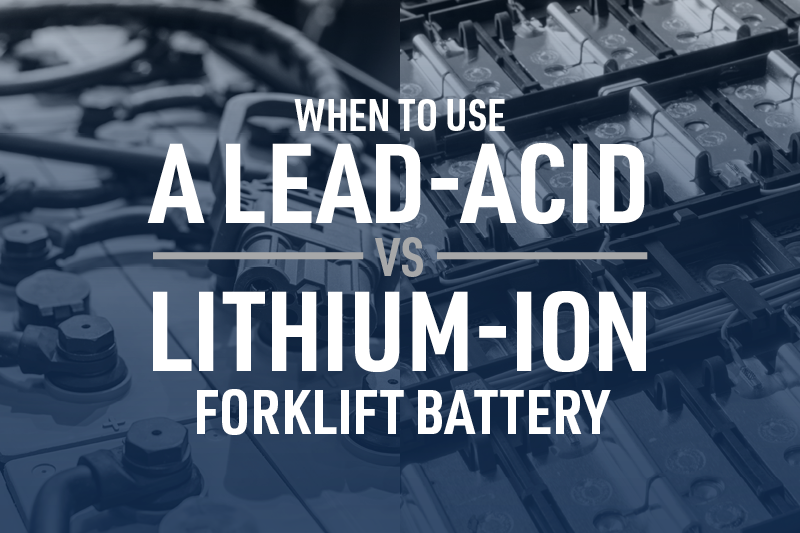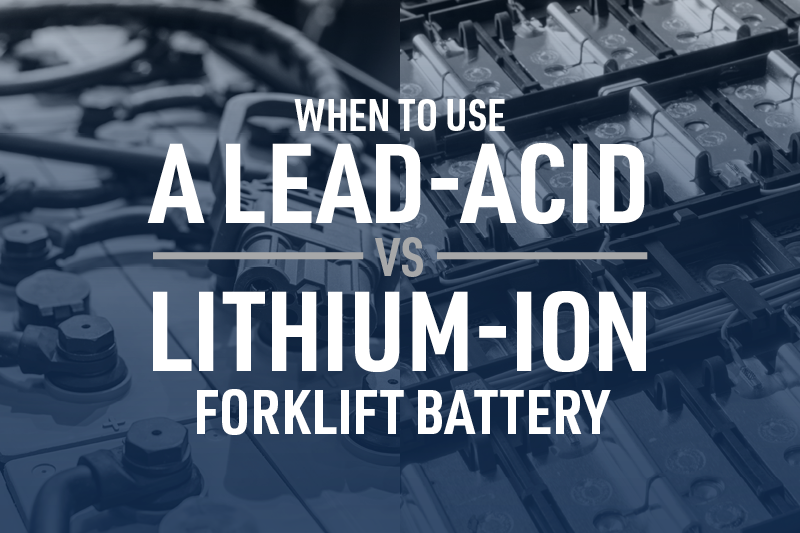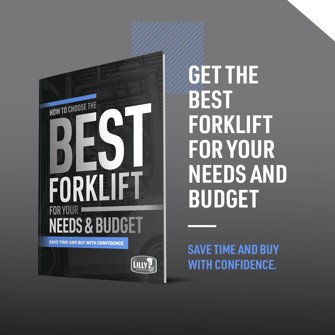3 min read
When to Use a Lead-Acid Vs. Lithium-Ion Forklift Battery
John Wofford
Feb 26, 2022 9:27:04 AM


If you run a multi-shift operation and haven’t started learning about lithium-ion forklift batteries yet, you may be surprised to know: A lithium-ion forklift battery can pay for itself in less than three years through:
- Improved productivity
- Reduced maintenance costs
- Lower energy bills
- And reclaimed space
Single-shift operations that don’t expect to become multi-shift operations are generally better off with cheaper lead-acid batteries. That said, it’s worth doing the math.
Read on to learn more about the pros and cons of lead-acid forklift batteries versus lithium-ion forklift batteries. Short on time? We can help you run the numbers and quickly decide which option is right for you. Contact us online or by phone at 844-LILLYCO (1-844-545-5926).
If you’re debating whether to buy an internal combustion (IC) forklift vs. battery-powered forklift, you might want to read our free Forklift Buyer’s Guide first.
How to Choose the Right Forklift Battery
Nearly two-thirds of all forklifts sold in the U.S. are electric, and 7-10% use a lithium-ion battery. That may not seem like much, but five or six years ago, that percentage was zero.
Experts speculate we're in a big transition period away from lead-acid batteries towards lithium-ion. A recent article from Forklift Action notes:
The benefits of lithium vs. lead-acid batteries have been tested and proven by major companies across all industries ( logistics and 3PL, retail, manufacturing, paper and packaging, metals, lumber, food and beverage, cold storage, medical supplies distribution, etc. Industry experts are speculating about the growth rate… but all agree that the adoption of lithium will continue to accelerate, similar to what we see in the passenger EV market (enabled by similar lithium technology). By 2028, the lithium segment may constitute 48% of all new forklift batteries.
Lead-Acid Forklift Batteries
Let’s start with the standard forklift battery everyone knows: lead-acid. You may have also heard them called flooded lead-acid or wet cell batteries.
If you buy an electric forklift, it will come with a lead-acid battery by default. This type of forklift battery costs significantly less than lithium-ion. But the lower purchase price comes with long-term expenses: weekly maintenance and (for multi-shift operations) a dedicated space for battery charging.
Approximately once a week, lead-acid forklift batteries must be cleaned and watered. This requires a special watering system, safety equipment and properly trained personnel.
Lead-Acid Forklift Battery Pros:
- The cheapest option
- Easy to find service providers when needed
Lead-Acid Forklift Battery Cons:
- Requires 8 hours to charge plus 8 hours to cool down
- Power declines as the battery discharges
- Weekly maintenance (cleaning and watering) required
- Need space to charge and store extra batteries
- Capacity decreases up to 35% in cold environments
Lithium-Ion Forklift Batteries
Recently, a major equipment manufacturer discovered they could save $1 million+ per year by switching to lithium-ion. Wondering if your business could uncover massive cost savings like this? Try this simple experiment:
- Ask forklift operators to track how much time they spend charging, changing and maintaining forklift batteries every week. Multiply the total time by the hourly cost of labor.
- Next, add up how much you’ve spent on batteries over the past 10 years. Lithium-ion batteries last 5-7 years (on average). So even though they cost more upfront, you won't buy them as often.
Add up your labor and battery costs and compare to what you would have spent on lithium-ion batteries (feel free to contact us for pricing). You may find those “cheap” lead-acid batteries cost a lot more in the long run.
You don't need to add in labor costs for lithium-ion forklift batteries because once they get installed in the truck, that's pretty much it. Lithium-ion batteries are virtually maintenance-free.
Lithium-Ion Forklift Battery Pros:
Lithium-ion batteries can be opportunity charged during breaks without harming the battery. Also, lithium-ion batteries recharge three times faster than lead-acid batteries. Bonus: you don't have to wait for a lithium-ion battery to cool down.
Other benefits include:
- 30-50% less energy required to charge the battery
- Consistent power even as the battery discharges
- 5-7 year lifespan (2-3x longer than lead-acid batteries)
- Virtually maintenance free (no watering)
- Zero exhaust
Lithium-Ion Forklift Battery Cons:
- 3-4x higher purchase price
Lithium-Ion Forklift Battery ROI
Generally speaking, a lithium-ion forklift battery will pay for itself within 3-5 years. A multi-shift operation will recoup costs much faster through:
- Reclaimed space
- Reduced equipment downtime (no battery swapping)
- Improved employee productivity (no maintenance or battery swapping)
- Lower energy bills
- 2-3x longer battery lifespan
Forklift Battery Sales, Service and Advice in the Mid-South
Converting to lithium-ion is extremely easy. We’ve helped dozens of businesses across the Mid-South reduce operating costs by making the switch.
Our experienced and friendly forklift experts can help you choose the right forklift battery for your operation. Just give us a call at 844-LILLYCO (1-844-545-5926) or contact us online. You can also visit us at one of our 13 locations across the Mid-South.
Arkansas - Jonesboro
Alabama - Birmingham, Dothan, Irondale, Madison, Mobile, and Montgomery
Mississippi - Tupelo and Richland
Tennessee - Jackson, Kingsport, Knoxville, and Memphis
Further Reading:
When to Buy an Electric vs. LP Gas Forklift
Forklift Battery Basics: What You Need to Know
How to Move a Forklift With a Dead Battery - 3 Options
Posts by Tag
- Forklift (68)
- Forklift Service (21)
- Electric Forklifts (19)
- Forklift Safety (16)
- Warehouse Automation (14)
- Forklift Attachments (12)
- Product Review (12)
- Toyota Forklifts (12)
- Warehouse Planning (11)
- Parts (10)
- Clark Forklifts (9)
- Customer Solutions (9)
- Pallet Racking (8)
- Forklift Rental (7)
- Loading Docks (7)
- Material Handling Education (7)
- Purchasing Options (7)
- Aerial Equipment (6)
- Forklift Batteries (6)
- Forklift Accessories (5)
- Forklift Tires (5)
- Heavy Equipment (5)
- Forklift Fleet Management (4)
- Forklift Training (4)
- Pallet Jacks (4)
- Products (4)
- Utility Vehicles (4)
- Yard Spotter Trucks (4)
- Komatsu (3)
- Linde (3)
- Specialty Forklifts (3)
- Used Equipment (3)
- Warehouse Doors (3)
- Custom Shop (2)
- IC Forklifts (2)
- Manitou (2)
- COMBiLift (1)
- Forklift Brakes (1)
- Forklift Warranty (1)
- Gehl (1)
- Recruitment (1)









